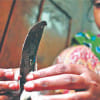A jarring anomaly of society

It is easy to miss stories about child domestic workers being tortured and killed. Easy because stories of children being killed have become eerily regular. It is May 28 and there is the report of 14-year-old Konika Rani being hacked to death by a drug addict with three of her classmates also grievously injured by him. There is also the horror of having to read about a six-year-old being left critically wounded after being raped by her neighbour. Next to this is the news of 11-year-old Hasina Akhter dying in hospital from the fatal wounds inflicted on her, presumably by her employers.
It's hard to choose which incident merits more attention – they are, after all, all children. But for now let's just focus on the child domestic worker. Why? Because in the other two cases, such attacks, though heinous and reprehensible, are unpredictable. In the case of Hasina, however, the chance of abuse is uncomfortably high. Child domestic workers – a staggering 421,000 in number, according to Unicef (2015) - are possibly the most vulnerable to physical and sexual abuse mainly because they are confined to a house 24-7 and have little means of escape.
Extreme poverty forces families to send their children to homes of the more privileged. Once they are employed, they are at the mercy of their employers and their families. They are often made to do the work of an adult and paid a pittance. They work odd hours and are given hardly any time to rest, least of all play. School, for most, is no longer a part of their lives. But the worst part of their working environment is that they will be severely reprimanded in the form of verbal or physical abuse for making the smallest of mistakes. A Unicef study has reported as much as 60 percent of child domestic workers saying that they faced some kind of abuse during work, such as slapping and scolding; more than half received no wage at all.
The fact that Hasina Akhter did not even get a chance to say goodbye to her mother before her frail little body gave in to the injuries inflicted on her, is not surprising. Yet the extent to which her tormenters went will not fail to make one feel sick to the stomach: her hand and leg were broken, there were burns on her back and injuries on her head and other parts of her body, her face bloodied. This is how her mother Salma Begum found her when she rushed from her home in Mymensingh to Dhaka Medical College.
Salma, a domestic worker, had fallen ill and she sent her little daughter Hasina to her employer Shariful Islam's house in Mohammadpur. She was to do some light housework and play with the children. For four months, however, Salma had no news of her child, until she got the ominous call from her employer that Hasina had typhoid and malaria and was in hospital. According to a news report, Shariful Islam had brought a severely injured Hasina to the hospital, telling the police on duty that he had found her lying on the street. After admitting her to the hospital, Shariful quickly left the scene. Later, when the police went to Shariful's house, after Salma had spoken to them, the couple had already fled. They were later arrested from Sreepur while in hiding.
There may be all kinds of socio-psychological explanations behind such barbarity inflicted by people who otherwise appear quite 'normal'. Think of the well-known cricketer and his wife who turned out to be sadistic torturers of their child domestic worker. We don't need experts to tell us, however, why employers think they can get away with abusing child workers. Despite the Domestic Workers Protection and Welfare Policy-2015, which has been approved by the cabinet, there has been virtually no move to enforce this policy that would require all domestic workers to be registered as well as be guaranteed basic rights in terms of working hours, leave, benefits, health care and legal redress. Despite laws that serve the harshest punishment for physical torture, rape and murder of children, child domestic workers continue to be victims of all kinds of abuse.
The reason is simple. It is easy to beat and torture a child and get away with it. Child workers do not have a voice and there are no avenues by which they can get help when they are being victimised. The worst part is that in many cases the entire family collaborates in the torture. There is no one to speak out for the child domestic worker. Neighbours may hear their cries of help but few will try to intervene.
The idea of child labour is abhorrent in any society but it is a reality that we have done little to fix. Poverty compels families to send their children to the city to work in strangers' homes in the hope that they will be fed, clothed and given some money to help them survive. This makes it a complex issue, one that cannot be solved with blanket bans without addressing the factors that push children into domestic work. But can we call ourselves a civilised nation if we continue to employ little children to work like adults who are vulnerable to abuse? It is hard to accept the truth that while employers shower their own children with love, caring and indulgence, when it comes to their child domestic worker, she/he is treated with contempt, neglect and sometimes brutality. Essentially, it is a class issue and the feudal mindset of society serves to perpetuate the idea that domestic workers are inferior beings with child domestic workers falling in the lowest rung of the ladder.
While we may wait for the Domestic Workers Protection and Welfare Policy-2015 to make any significant change in the lives of domestic workers in general, the state must work towards the total prohibition of employing children for household work, which can only be defined as hazardous child labour. This is because no matter how much we harp on having helplines, monitoring teams, mandatory schooling and enforcement of stringent laws to ensure the safety and wellbeing of child domestic workers, in the real world, human beings have a propensity to become monsters when no one is looking.
The writer is Deputy Editor, Editorial & Opinion, The Daily Star.

 For all latest news, follow The Daily Star's Google News channel.
For all latest news, follow The Daily Star's Google News channel. 







Comments